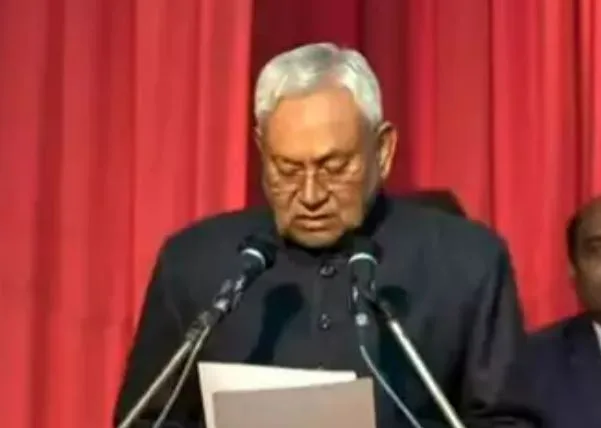Turncoat: A disease and now Routine beyond repair in the politics of the Indian Subcontinent
In the dynamic landscape of politics in the Indian subcontinent, the turncoat phenomenon has become a noteworthy and, at times, contentious aspect of the political arena. On 28th Jan 2024, Janata Dal (United) president Nitish Kumar on Sunday took oath as the chief minister of Bihar for a record ninth time. As Nitish Kumar does another volte-face, a look at other leaders whose dramatic decisions changed the political course of the country
Last year Imran Khan’s federal government in Pakistan collapsed after supporting smaller parties withdrew support along with his party PTI’s few MNAs switched sides and voted in favor of the no-confidence motion tabled by the opposition.
Turncoat politics involves politicians frequently switching political affiliations, often in pursuit of personal gains or political survival. India and Pakistan are two nations in the Indian sub-continent where recently this “Ayaram-Gayaram’ style of switchover has become a routine and somehow accepted phenomenon.
Here let us deep dive into the impact of turncoat politics on the ethical and moral fabric of political systems in the region, examining key events where governments collapsed due to the frequent change of loyalties by political leaders.

The Turncoat Phenomenon:
Turncoat politics, characterized by politicians shifting allegiances with remarkable frequency, has become a recurring theme in the political narratives of countries in the Indian subcontinent. This phenomenon has led to increased political instability, a lack of trust among citizens, and questions about the ethical standards of politicians.
Impact on Ethics and Morality:
- Erosion of Trust:
- Frequent political defections contribute to a loss of trust among the electorate. Voters become skeptical about the sincerity of politicians and question whether their actions are driven by principles or opportunism.
- Policy Instability:
- Turncoat politics often results in policy instability, as new alliances may bring about shifts in governance priorities and ideologies. This can hinder the implementation of long-term policies beneficial for the public.
- Diminished Accountability:
- The constant shuffling of political affiliations can lead to a lack of accountability. Politicians who frequently change parties may evade responsibility for their actions, as they can attribute policy failures to their ever-changing political circumstances.

Events Shaping the Narrative:
- Aaya Ram Gaya Ram Phenomenon (India, 1967):
- The term “Aaya Ram Gaya Ram” gained prominence in Indian politics in 1967 when a Haryana legislator, Gaya Lal, changed his party three times in a matter of 15 days, leading to the collapse of the government. This incident epitomized the turncoat politics prevalent at the time.
- Ajit Jogi and the Collapse of the Congress Government in Chhattisgarh (India, 2019):
- The Congress government in Chhattisgarh collapsed in 2019 when former Chief Minister Ajit Jogi’s Janata Congress Chhattisgarh (J) extended support to the BJP. This shift in alliances demonstrated the fragility of political stability in the region.
- HD Kumaraswamy’s Departure in Karnataka (India, 2019):
- The collapse was brought about by the resignation of 15 legislators both from Congress (INC) and JD(S) together. This paved the way for BJP to form the state government with support from these turncoats.
- Kamal Nath government in Madhya Pradesh (India, 2020):
- The Congress under Kamal Nath formed a government in Madhya Pradesh in 2018. However, the government fell in 2020 due to a rebellion by 22 Congress MLAs.
There are many other examples where lawmakers switched sides for personal or political gains and did not respect to people’s mandate.
Also Read Donald Trump: Court Orders to Pay $83m as Defamation Damages to E. Jean Carroll
Also Read Kim Jong Un: North Korean leader Declares South Korea as “Primary Foe”
Addressing Turncoat Politics:
- Strengthening Anti-Defection Laws:
- Revisiting and strengthening anti-defection laws can act as a deterrent against frequent political defections, ensuring that elected representatives adhere to party ideologies and principles.
- Promoting Ethical Leadership:
- Fostering a culture of ethical leadership through political education and public discourse can help create an environment where politicians prioritize principles over opportunism.
- Enhancing Transparency:
- Transparency in political decision-making processes, including coalition formations, can contribute to a more informed electorate and discourage politicians from engaging in opportunistic turncoat behavior.
The turncoat phenomenon in the Indian subcontinent has far-reaching implications for the ethical and moral underpinnings of politics. As instances of politicians switching loyalties continue to shape political landscapes, the need for robust mechanisms to curb this trend becomes imperative. By addressing the root causes and promoting ethical leadership, countries in the region can strive for a political environment that values stability, trust, and principled governance over the transient gains of turncoat politics.

